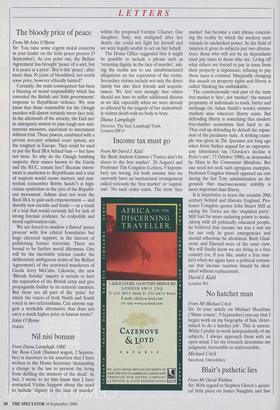LETTERS The bloody price of peace
From Mr John O'Byrne Sir: You raise some cogent moral concerns in your leader on the Irish peace process (9 September). As you point out, the Belfast Agreement has brought 'peace of a sort, but it is peace at a price'. But is this 'peace', after more than 30 years of bloodshed, not worth some price, however ethically tainted?
Certainly, the main consequence has been a blurring of moral responsibility which has corroded the British and Irish governments' response to Republican violence. We now know that those responsible for the Omagh murders will almost certainly never face trial. In the aftermath of the atrocity, the Dail met in emergency session to pass tough new anti- terrorist measures, equivalent to internment without trial. These powers, combined with a proven non-jury criminal court system, are the toughest in Europe. They could be used to put the Real IRA behind bars — but have not been. So why do the Omagh bombing suspects, their names known to the Garda and the RUC, remain free? Because intern- ment is anathema to Republicans and a trial of suspects would create martyrs; and mar- tyrdom (remember Bobby Sands?) is high- octane symbolism in the eyes of the Republi- can movement. Adams does not want the Real IRA to gain such empowerment — and thereby new recruits and funds — as a result of a trial that would certainly fail for lack of strong forensic evidence. So realpolitik and moral equivocation rule.
We are forced to swallow a flawed 'peace process' with few ethical boundaries but huge electoral support, in the interest of politicising former terrorists. There are bound to be further moral dilemmas. One will be the inevitable release (under the deliberately ambiguous terms of the Belfast Agreement) of the convicted murderers of Garda Jerry McCabe. Likewise, the new `Bloody Sunday' inquiry is certain to hurt the reputation of the British army and give propaganda fodder to its terrorist enemies. But these are all part of the 'price' for which the voters of both North and South voted in two referendums. Can anyone sug- gest a workable alternative that does not carry a much higher price in human terms?
John ORyme
Dublin


































































 Previous page
Previous page